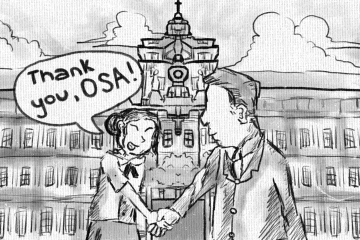 I HAVE been used to the sight of a small tube accompanied by the purchase of a Gulp beverage at 7-Eleven. Expected to be given one, I guiltlessly asked for a straw. To my surprise, the convenience store no longer offered that “convenient” option. Although some establishments still offer plastic straws, a customer would need to ask for one.
I HAVE been used to the sight of a small tube accompanied by the purchase of a Gulp beverage at 7-Eleven. Expected to be given one, I guiltlessly asked for a straw. To my surprise, the convenience store no longer offered that “convenient” option. Although some establishments still offer plastic straws, a customer would need to ask for one.
Have you ever wondered about its trip right after using it? Most of these tubes end up in the ocean, and that turtle that has a straw being pulled out from its nose is one of the consequences of dumping these plastics.
Data show that the United States consumes an estimate of 500 million straws daily. Straws undergo breakdown and decomposition which takes up to 200 years, then they turn to microplastics which can go to streams, rivers, and oceans afterward, according to an article by the National Geographic. Due to the immense harm that straws cause to the environment, various groups have campaigned for their ban and laws were soon passed.
Most are advocating a more environmental-friendly alternative to these straws. The most commonly offered are stainless steel straws and parts of the line-up are glass and bamboo straws. Most are reusable, especially the metal straws that can be cleaned as well. This is a good cause and I agree to that but did you ever wonder: why do I have lips in the first place?
Do you recall how you can drink perfectly without the use of straws? Well, apparently you can, and this makes the use of plastic straws almost obsolete. There is also a study by Renée Rouleau, a skin care expert, that says the use of straws leads to getting wrinkles surrounding one’s mouth. This is because of the sipping action that breaks down the skin’s collagen and elasticity, as seen in a smoker’s wrinkly mouth vibe, among others.
We have had enough of this waste. Skip the straw.
A polite request of saying no to plastic straws will help a lot in reducing the existing pollution. Instead make a statement by utilizing a paper, glass, bamboo, or stainless steel straw. You can also suggest to places where you eat to alter their protocol of giving out straws instantly. If they are still to offer one, propose to use paper straws instead.
The University of Santo Tomas (UST) is also gradually taking small steps to lessen to the contribution of harmful effects to the environment. The University as a styro-free campus has banned polystyrene while encouraging its members the use of reusable materials. With the efforts of the UST Central Student Council staff, a project to give out limited free metal straws and a cleaning brush was organized on May 26, 2017 at the Plaza Mayor.
But the straws were more than a freebie—it was a movement to lessen the contribution of this wasteful commodity to the worsening plastic pollution and harming of the environment and wildlife. But the key to a zero-waste lifestyle is to use no straw at all. Enjoying your beverage in the natural way of drinking can make even the use of reusable straws unnecessary. People have lived without this lightweight commodity that is so short-lived through a supposed single-use disposal. We can eradicate this from our lifestyle and, eventually, contribute to a positive change. F
For feedback, email guthrieromano.theflame@gmail.com.



